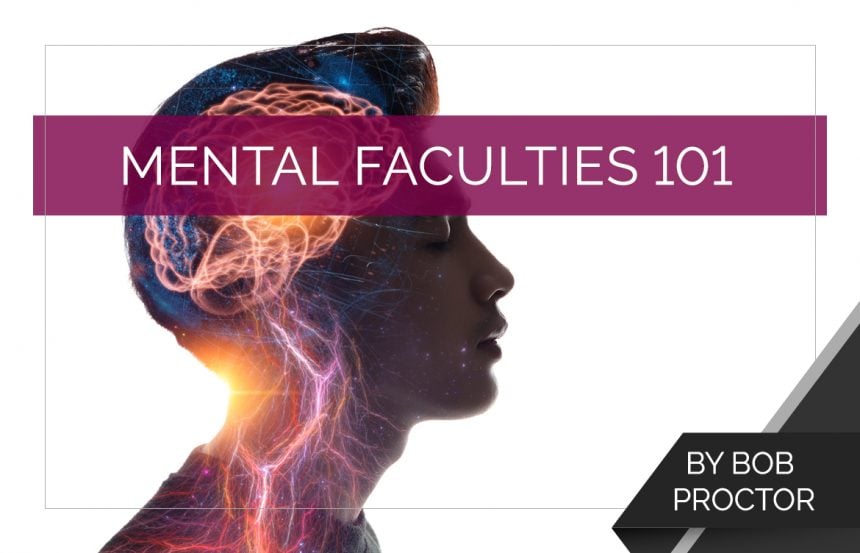
You see, the other creatures are completely at home in their environment. However, unlike chameleons and other animals that blend into their environment, you and I are totally disoriented in ours.
Now why is that?
It’s because God gave us mental faculties to create our own environment. And fully and effectively using those mental faculties allows us to create any life and environment we want.
Unfortunately, only one or two people out of ten can name their mental faculties and how to use them properly.
They don’t teach it in school
It’s not surprising that so few people understand how to use their mental faculties. They don’t teach it in school.
Instead, teachers tell us about the five physical senses we share with the rest of the animal kingdom—the ability to see, hear, smell, taste, and touch.
These senses are given to us so we can communicate and correspond with the outside world. They’re like little antennae that bring in information that’s outside of us.
Our physical senses are wonderful for what they were intended to do. However, we give them far too much power.
Are you their plaything?
We allow our sensory factors to get us in trouble. We let what people say, what we see on the news, and our current circumstances, such as what’s in our bank account, control our lives.
But it doesn’t have to be that way. Unlike other creatures, we don’t have to be subjective to what’s going on around us. We are creative beings, and we can change our circumstances.
That’s where our six marvelous mental faculties come in:
√ Imagination
√ Will
√ Intuition
√ Memory
√ Reason
√ Perception
Although you’re already using each of these faculties, there’s a good chance that you often use them unwittingly to create results you don’t want.
Increase your awareness
Exploring and strengthening your mental faculties greatly improves your chances of creating and enjoying the life you want. So, we’re going to dive deeper into these faculties throughout the month.
Today, we’ll begin with a brief introduction of each faculty and a simple exercise to start strengthening it.
1. Imagination
Your imagination allows you to create something out of nothing. It’s what you use to take something that is non-physical and turn it into something physical.
When you create an image of something you want in your mind, you’ve raised your frequency of thought to that level, and you’re capable of doing or getting it. However, many times we use this faculty the wrong way by imagining bad things happening to us or other things we don’t want. The key is to learn to use your imagination consciously and purposely to create the experiences that you want most in life.
An Exercise for Using Your Imagination in a Positive Way
• Edgar Allan Poe said, “They who dream by day are cognizant of many things which escape those who dream only by night.”
Daydreaming is more deliberate than merely dreaming, and that makes it more effective in opening your mind to possibilities. So, take a break from your daily tasks each day to relax, and let your mind wander.
Amuse yourself by speculating on specific ways you would like to see your life improve, and it will soon become a habit. And one day your daydreams may become your reality.
2. Will
The will allows you to hold one idea on the screen of your mind to the exclusion of all outside distractions that are begging for your attention through your physical senses. It gives you the ability to concentrate, to focus your attention on one thing.
Many people have trouble staying focused. They bounce around from one thing to another and never finish anything. However, when you use the will as it was designed to be used, your thoughts become much more powerful. And your sustained concentration allows you to get a lot done in a short time.
An Exercise for Discovering How You’ve Been Using Your Will
• Spend a few minutes answering the following questions with complete honesty:
-
- Where in your life are you using concentration to sabotage yourself?
- Are you spending more time focusing on what was or is, and what you don’t want, or where you’re going and your current goals?
- If you knew, without a shadow of a doubt, that your will alone could change your present circumstances, would you have the discipline to focus on the good?
3. Intuition
Intuition is God’s way of talking to you. It’s the small voice inside that speaks your truth. It also gives you the ability to pick up other people’s thoughts and to read their energy.
As you learn to turn down the volume of the noise around you and turn up the volume of your intuition, your life will become fuller, and you will feel more connected to others.
An Exercise for Getting In Touch With Your Intuition
• Stop and Listen: It’s hard to tune in to your inner wisdom when you’re constantly busy. So, take some time each day to slow down and be more open to your higher self. If you’re looking for an answer to a question, or you have a decision to make, start looking inside yourself for the answers before you choose which path to take.
Intuitive messages are subtle and can fade from your conscious mind very quickly. So, write them down or record them immediately even if you can’t act on them right away.
4. Memory
There’s no such thing as a bad memory. There are only weak and strong memories. Like a muscle, you can develop your memory by a phenomenal degree through exercise.
An Exercise for Developing Your Memory
• Use your senses. The more senses you involve when you learn or do something new, the easier it is to remember it.
For example, if you want to remember someone’s name, it may help to look them in the eye when you repeat their name and offer a handshake. That will engage four out of your five senses.
5. Reason
Our faculty of reason is what we use to think—to analyze, compare, and evaluate ideas. Reason is the ability to think and choose what information we accept, stir up, and use to come up with brand new ideas.
You can use reason to pluck other people’s thoughts or to build and create your own ideas from the ether.
An Exercise for Developing Your Reason Faculty
• Practice Being UNreasonable. Most people think being reasonable means stifling or sacrificing their own dreams and goals out of fear: fear of disappointing someone, fear of being laughed at, or fear of going against the crowd or disrupting the status quo.
However, neuroscience has shown that we use only about five percent of our brain. So, venture into unchartered territories and practice being unreasonable.
Write down the ways you are holding back on going for (or even acknowledging) what you really want in life because you’re afraid it might be unacceptable or impossible. Then, relax and use reason to come up with a list of new ideas and strategies to get what you want.
6. Perception
We don’t see with our eyes; we see through our eyes. For that reason, we often see things that aren’t there.
Your perception is your point of view. It controls what you become aware of in your environment and how you choose to see it.
There is duality in most everything – front/back, up/down, in/out, and good/bad in everything. And we always have the choice of what to focus on.
In the subconscious mind, perception determines what we become aware of. We’re flooded with billions of bits of information every second in our conscious mind, and we can only process a tiny fraction of them. Two main criteria determine what gets through – what agrees with our beliefs and what our mind believes is important to us.
An Exercise for Developing Your Perception
• Grab your phone and go into any room in your house. Stand at one end of the room and take a picture. Turn around, walk to the other side of the room, and take another shot. Then compare the two images side by side. One room, two totally different pictures.
Now take that lesson and apply it to one of the “rooms” in your life. Pick a different vantage point from which to view your primary relationship, your career, or your financial situation. No matter what you’re looking at, do your best to look at it objectively, as a stranger might.
A singular perception in your life can prohibit your growth. A different one can exponentially expand it. Keep shifting your position until you find that one, then stay there.
You have a marvelous mind
Napoleon Hill said, “An educated man is not, necessarily, one who has an abundance of general or specialized knowledge. An educated man is one who has so developed the faculties of his mind that he may acquire anything he wants, or its equivalent, without violating the rights of others.”
And Einstein said, in our society, we honor the servant—the rational mind—and have forgotten the gift of our intuitive mind or the mental faculties.
There are a few problems with letting your rational mind run or control your life, but one of the biggest ones is that your rational mind is largely controlled by irrational paradigms.
Your power in creating the life you want lies in using your mental faculties to help you change your paradigms.
To your success,
Bob Proctor








